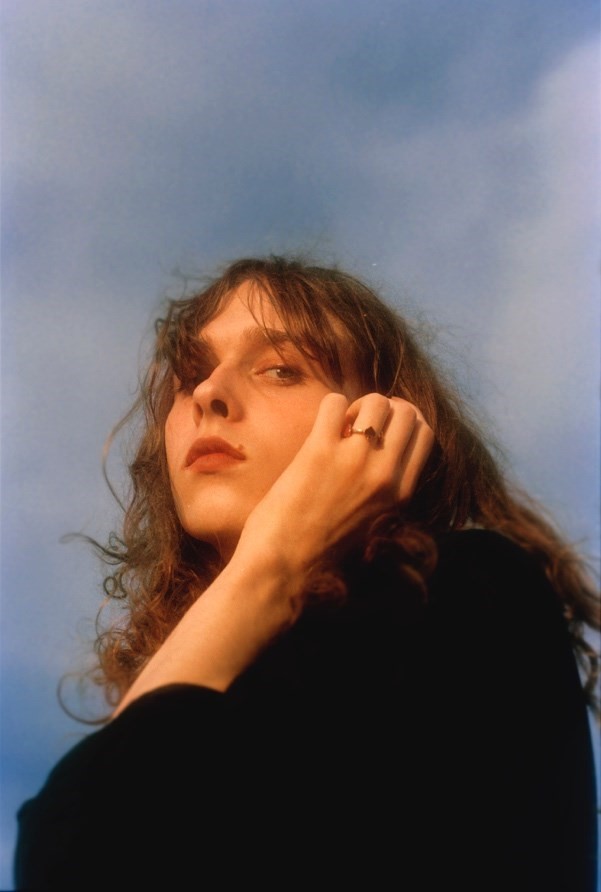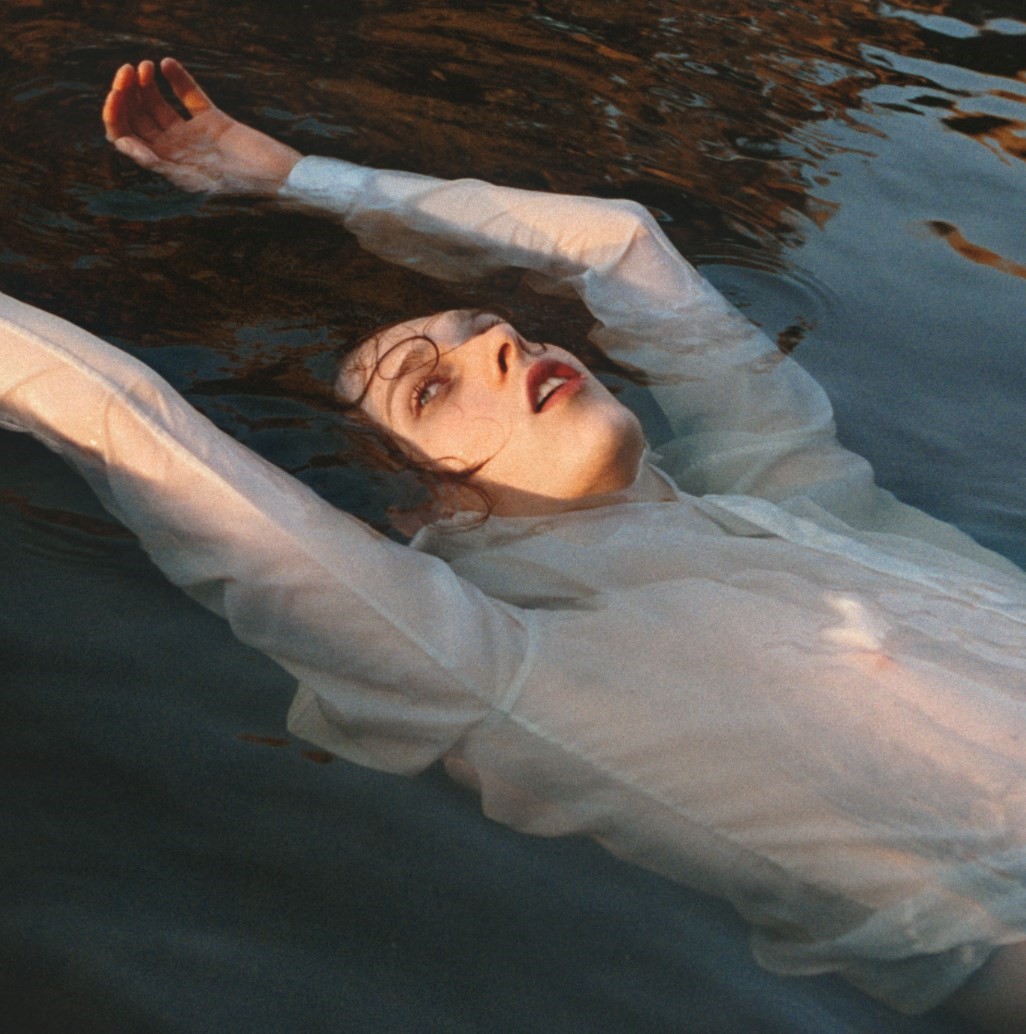It’s day one of the second national lockdown and Lauren Auder is in her bedroom, at home in London. The sun is shining, and the results of the presidential election are still hanging in the balance. “We are speaking in a liminal space,” I begin our conversation. “Well, it’s a beautiful day for an apocalypse,” Auder replies through a computer screen, before pulling her hood tighter around her face.
Auder, now 21, has been on a long journey with her music. The sonic might not have changed so noticeably – for those who know her, they’ll know she’s a sorceress who commands a deep voice mixed around swirling musical arrangements, what she describes as “orchestral pop.” But the subject matter is shifting for this person who computed the process of transition through her first two EPs.
Two EPs which were about her, and “holding up a mirror to” herself. And while she never sings explicitly about her identity – something which I remark is refreshing when wider culture likes to congratulate itself for going as far as, but rarely further than, ‘representation’ – the first two records are all based in the internal world of Lauren Auder.
But her upcoming EP – 5 Songs for the Dysphoric, a name which Auder admits is indeed very “on the nose” – is about other people. Or more specifically, it’s about her interactions with other people, and how being trans affects intimacy with those people. The first single from the record – Animal – is out today.

Tom Rasmussen: I’ve been listening to you loads and been thinking about this amazing ability you have to make your listener feel held. Is that your intention?
Lauren Auder: Definitely. 100 per cent. I couldn’t put it better myself. My intention to make music that makes people feel held and makes people feel like there’s a place [for them]. I think for people like me growing up outside of the normal, music was a place of solace. I guess that’s the same thing that I want to translate. I always come into music as a fan. So there’s always a big question: what would I want from a musician? I think that a big part for me is to [make] the music that I needed when I was growing up.
TR: I always think it’s so ironic, isn’t it? Writing anything from the margins is often self-authored. But actually, the intention is quite selfless; it’s often to use yourself as a conduit for other people’s experiences and emotions. Would you agree?
LA: Yeah. I mean I’m sure there’s a fair amount of ego involved in anyone deciding to write. But I think a big part of it is delving in with the intent that it will be useful outwardly. I think all my favourite musicians are people who are very personal. The act of opening up is always something that feels comforting, even if it’s in a conversation with a friend, it’s the way you create true ties to people.
“My intention to make music that makes people feel held and makes people feel like there’s a place [for them]” – Lauren Auder
TR: Do you think that’s where the ability to write about such a specific experience and actually make it translatable to a wider audience comes from? When you approach a song, do you think about an overarching emotion or a really specific story?
LA: I think it’s the more specific experience that I write about. I find this the most effective, affecting. It’s definitely become a more specific process, because there’s a trust between myself and the people who I hope will listen to me. And also there’s a certain emotional intelligence that is innate to human beings. We can take other’s lived experiences and, if we have the will, we can always understand that, and relate that to our own lives.
TR: Yeah, because I also think a lot of contemporary music can quite easily patronise a listener. Hmm … maybe that’s too savage?
LA: I have many hot takes. I think especially when it comes to music that is dedicated to a more youthful audience, like teenagers. I guess in my heart, that’s who I would want to touch most because, as I said, that’s when I found the artists that were really important to me and really helped me. I think for a younger age group [music] can be very patronising or belittling to the grandeur of the emotions that you go through at that period of time. When really that’s maybe when emotions feel the grandest.
TR: That’s what your second EP, two caves in, was about right? This grand journey of teenage emotion? But, and perhaps because as a trans queer person myself I’m destined to go through a delayed adolescence, that EP really touched me, too.
LA: When you spend quite a lot of time not being able to fully realise yourself, in a public sense, or in your own life, then you have you go through those transitional phases quite a bit later. I think that was definitely the case for me. A lot of my own development and my personality was very hard to define when you’re living with a mask. I think that only really started to come off in the past two years.
TR: It’s interesting, the idea of the ever-changing nature of an artist. Because when we think of the pressure on female artists to reinvent constantly, it’s sort of more refreshing, or maybe just more realistic, to instead see that process as one of like constant evolution.
LA: I think reinvention implies that there’s something manufactured about it. But there’s definitely a constant conscious effort in my work to change along the way. I think I arrived at the pinnacle of what I was attempting to do for the past three EPs, at the end of the last one: which was to make some orchestral pop music. Hopefully I will be able to surpass what I’ve done there, because I felt like I arrived at a point where I’d done what I wanted to do with that sound. So a reinvention here might just mean a big change.
“What I’m trying to talk about on the songs is the collateral damage of issues like dysphoria, rather than dysphoria explicitly” – Lauren Auder
TR: And now you’re nearing your next release, 5 Songs for the Dysphoric. What’s different about this upcoming release?
LA: I think letting external influences in. I wanted to explore different sounds and do different things. And I guess that in some ways it could be some sort of reinvention. I think there’s a lot more electronic music on the new record, and there’s a lot more focus on shorter and more concise songs. But it’s not so much a reinvention, it’s just like the natural shift in the way I want to express myself. I have a real desire right now to be more direct. I guess that’s even supposed to come through in the record title, which is really on the nose.
TR: Even though the last two EPs have been about yourself, as a trans person it’s refreshing for me to hear someone explore transition and not have to talk explicitly about them. It sort of feels beyond representation and into the nuances of the experience of being trans.
LA: What I’m trying to talk about on the songs is the collateral damage of issues like dysphoria, rather than dysphoria explicitly. Or like the collateral damage of the trans experience. It’s not so much about the spirit specifically, but like, how that relates to your relationships and to the way you express yourself. It’s much more about how it affects the way I really relate to people, rather than it just being like an internal crisis. And that’s more what I was trying to write about, I guess, rather than my internal experience.
Lauren Auder’s next single Animal is out on November 12.
